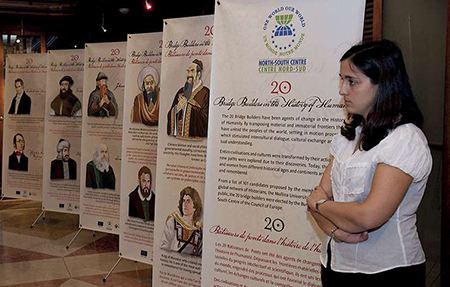Global Interdependence and Solidarity

One of the North-South Centre of the Council of Europe’s advantages lies on its insitutionalised “quadrilogue” engaging high-level representatives from governments, parliaments, local and regional authorities, as well as civil society from different regions of the world to work together on issues of common interest.
Among the “quadrilogue”, civil society is especially relevant to the work of the North-South Centre of the Council of Europe. It plays a central role in its governance and the execution of its initiatives. The North-South Centre of the Council of Europe relies on a solid network of youth organisations to facilitate structured, inclusive, and sustainable participation, resulting in a multiplier effect.
With over three decades of experience, the North-South Centre of the Council of Europe has proven its expertise in global education, intercultural dialogue, and youth sector cooperation in Europe and beyond, its mandate extending on the Southern Neighbourhood and Sub-Saharan Africa.
The North-South Centre of the Council of Europe benefits from those advantages in the implementation of its projects and events, such as:
- the Youth Universities in Spain, Tunisia, and Cabo Verde, consolidated youth networks and contributed to reinforce the skills of nearly 10,000 representatives of youth organisations in human rights, democratic participation, intercultural dialogue and global education;
- the Lisbon Forum, a platform that brings together personalities from various regions of the world to engage in a prospective exchange and take action on issues of common interest through initiatives like the Rule of Law Youth Network (RoLYN);
- the North-South Intercultural Conference, an international meeting to facilitate intercultural and interreligious dialogue;
- the North-South Prize of the Council of Europe, which has honored more than 50 laureates – including André Azoulay, Bob Geldof, Kofi Annan, Mary Robinson, Simone Veil, and the International Commission against the Death Penalty – for their contributions to the protection of human rights, defense of democracy, or raising public awareness on issues of interdependence and global solidarity.
The North-South Centre of the Council of Europe also offers online training courses that cover different dimensions of global education. It involves civil society organisations, national NGOs platforms and ministries from almost 40 countries part of its extended Global Education Network and organise the annual Global Education Week counting on more than 300 000 participants each year.
To support the implementation of the Reykjavík Declaration, the 2024-2027 strategy of the North-South Centre of the Council of Europe strengthens the external dimension of the Council of Europe to:
- enhance the impact of the Council of Europe’s Neighbourhood Policy with the Southern Mediterranean by disseminating the values and standards of the Council of Europe among the youth, a cornerstone to ensure the sustainability of democratic reforms;
- develop further and gradually cooperation with Sub-Saharan African countries that demonstrate an interest in the standards of the Council of Europe;
- act as a facilitating platform for dialogue between Europe and other regions of the world on the priorities of the Council of Europe.



